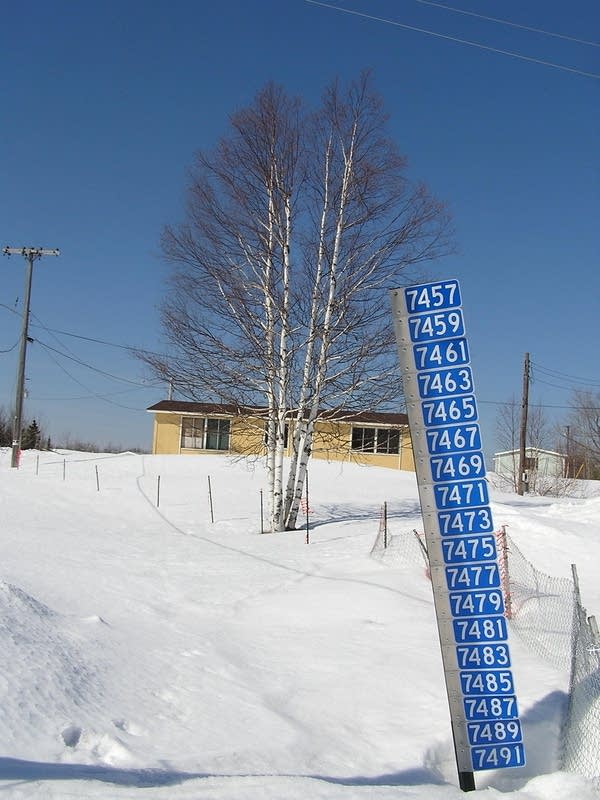Radar base could become vacation homes
Go Deeper.
Create an account or log in to save stories.
Like this?
Thanks for liking this story! We have added it to a list of your favorite stories.

Halfway between Duluth and Grand Marais, Highway 1 heads west into the wilderness. Ely is about 60 miles from here. But first there's Finland.
It's barely a crossroad, with a community center, a gas station, and a bar. Air Base Road climbs up Lookout Mountain.

"It's a very narrow road," says David Abazs as he navigates the road in his hybrid diesel car. "We had a death off this road this past winter."
Abazs and his wife run an organic farm near here. He's concerned about the plans for the mountain.
Turn Up Your Support
MPR News helps you turn down the noise and build shared understanding. Turn up your support for this public resource and keep trusted journalism accessible to all.
At the top, a half-dozen decrepit buildings molder by the side of the road. Steel towers stand like ghosts above the trees.
This is the old Finland Air Force Base. During the Cold War 350 people lived here. They kept an electronic eye on the Soviet Union.
"The main radar station is that building there to your right, a big white box with a circular walkway," says Abazs. "As you get a little higher you'll be able to see Lake Superior, and Wisconsin across the lake."
It's a stunning view. The Sawtooth Mountains stretch to the horizon in all directions -- except where Lake Superior shines like a brilliant turquoise in the distance.
But this mountaintop is not as clean as its surroundings.

"There's a lot of contamination," Abazs says. "Diesel contamination, PCBs. So this is now a Superfund site."
The Air Force sold the property. The current owners want to redevelop this land and turn it into vacation homes and affordable housing. They plan a total of 68 houses.
Finlandia LLC is owned by a Twin Cities family. They'll have to remove barracks and other buildings contaminated with lead and asbestos. Then they plan to renovate the 1960s era tract homes and sell them as affordable housing. Finally, they'll sell lots at the top of the mountain, for luxury vacation homes.
They drilled a well, which was quickly contaminated with solvents. Now the mountainside is dotted with monitoring wells. They're designed to track the flow of the solvents through the bedrock, to make sure the solvents don't contaminate nearby household wells.
The company had to drill a new, clean, well.
They also installed a new septic system, which didn't work properly. So they revamped the old septic system.
David Abazs has mixed feelings about all this. On the one hand, he'd like to see the pollution cleaned up. On the other hand, he wasn't happy when Lake County changed the zoning from ten-acre lots to 2-acre lots to accommodate the developers.
He says 68 new houses would more than double the existing population of Finland. He says a lot of people want new development.

"People have been leaving the area; they want their schools filled," he says. "But this development isn't going to fill the schools; it's going to fill the retirement homes. Because these people who are coming are going to be well off, without children, having a summer place."
And every new development drives up the cost of land.
"We can't buy land anymore, because our economy is on a different scale," he says. "This is third world-first world approach. The reality is locals, unless they've sold a million-dollar piece of land, can't buy land for their kids." Meanwhile, people at the Minnesota Pollution Control Agency are leery of the project, because of the company's track record.
The MPCA fined Finlandia about $140,000 for that septic system that didn't meet specifications. The company didn't pay the fine for five years, and with penalties it grew to nearly half a million dollars.
Steve Scallen, one of the family members behind Finlandia, says he fought the fine because it was based on a technicality. He says the septic system didn't cause any environmental damage.
"It took five years for everybody to get together and talk about it and reach a settlement," he says.
Scallen filed for bankruptcy, and the Pollution Control Agency settled for $40,000.
Scallen says the family has already sunk about a million dollars into the property, and they're still committed to their plan.

His son-in-law, Eric Rottier says the mountain is too beautiful to just sit there with its sagging buildings and contaminated soil.
"It's a question of, is it better off staying as it is, or developing it and returning it to a natural setting, with large lots, and affordable housing, and a cleaned-up site," he says. "I think everyone has unanimously said that's better than leaving it how it is."
Lake County has sent a letter to Rottier, laying out conditions the company must meet before it gives final approval to the project.




